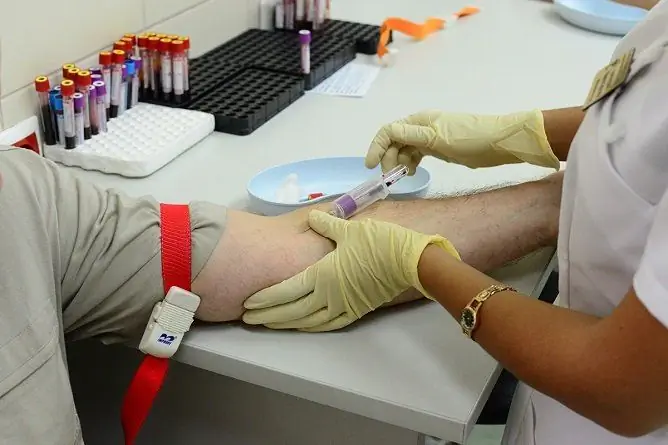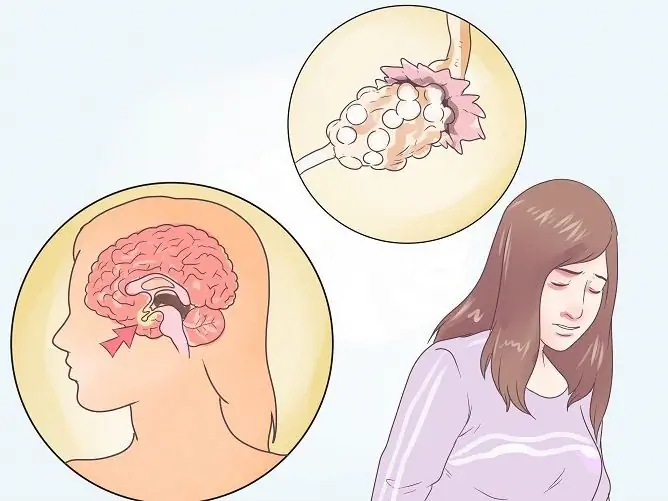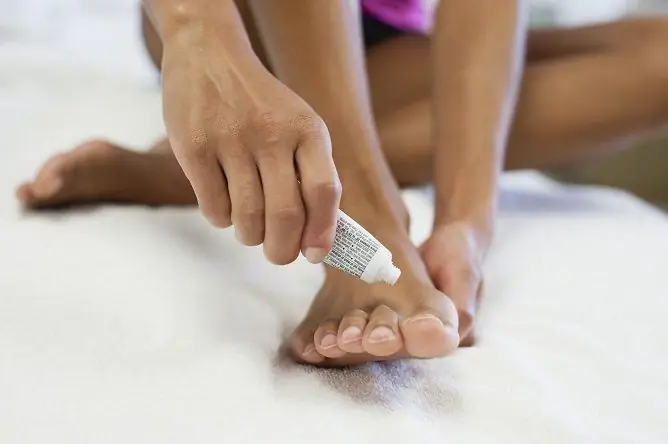- Author Rachel Wainwright wainwright@abchealthonline.com.
- Public 2024-01-15 19:51.
- Last modified 2025-11-02 20:14.
Anti-Müllerian hormone: how to increase its level, causes of deviation from the norm and role in the body
The content of the article:
-
What to do if the anti-Müllerian hormone is lowered
- Drug therapy
- General recommendations
- Folk remedies
- Reasons for AMG deviation from the norm
-
Diagnosis of abnormalities in AMH levels
Preparation for analysis
- Functions and role of AMH in the body
- AMH blood levels
- Video
Many patients are interested in the question of how to increase the anti-Müllerian hormone, which is related to indicators of reproductive health, because its level is of no small importance for the possibility of a natural pregnancy.

Before trying to increase the level of AMH, you should find out the reason for its decrease.
Anti-Müllerian hormone (AMH) is a biologically active substance that is produced in both women and men. In men, it participates in the formation of the genitals, and after puberty is complete, its synthesis decreases. In women, AMH is responsible for the antral follicles, that is, those that have the ability to mature into an egg, it is called the "follicle counter".
If a woman does not produce enough AMH, this may indicate infertility, and when pregnancy occurs, it may negatively affect the development of the fetus. These patients often have a history of unsuccessful attempts at in vitro fertilization (IVF).
You can also observe:
- menstrual irregularities;
- premature menopause;
- excess hair growth (hirsutism);
- too low weight or obesity.
Low anti-Müllerian hormone is of greatest importance during puberty and in reproductive age, when active follicular functioning is noted.
What to do if the anti-Müllerian hormone is lowered
If the production of AMH is impaired, one should not self-medicate, try to raise the level of the hormone on one's own, since this will most likely only lead to an aggravation of the patient's condition and loss of time, during which it would be possible to solve the problem by contacting a doctor.
In the case of planning a pregnancy with a reduced concentration of AMH, consultations are held with the following specialists:
- gynecologist;
- endocrinologist;
- reproductive specialist.
When the concentration of anti-Müllerian hormone is reduced as a result of age-related or pathological changes in the reproductive system, leading to a decrease in the ovarian reserve, it is not possible to increase it.
In case of impossibility of natural conception due to a low level of AMH, women may be recommended in vitro fertilization with the use of donor eggs, surrogacy.
With a decrease in the indicator in patients of reproductive age on the background of endocrine pathologies, diseases of the reproductive system or physiological reasons, it is possible to increase the anti-Müllerian hormone in women.
The treatment regimen depends on the cause of the decrease in the indicator.
Drug therapy
- In some cases, with a low anti-Müllerian hormone, patients are prescribed drugs that stimulate ovulation (for example, gonadotropic drugs). Such funds can be used for anovulation against the background of endocrine pathologies.
- It is possible to suspend age-related changes in the ovaries with the help of dehydroepiandrosterone preparations (DHEA, DHEA). The doctors' comments about them are mostly positive.
General recommendations
In addition to the main treatment, it is usually recommended:
- Diet. It is recommended to include lean fish, caviar, egg yolks, vegetables and fruits, mushrooms, oats in the diet. It is necessary to exclude the use of offal, fried, fatty, salty, spicy and smoked foods, sweet carbonated drinks, limit the use of white bread, confectionery, pasta, strong tea and coffee.
- Compliance with the regime of work and rest. Stressful situations, excessive physical and mental stress should be avoided, and sufficient night sleep should be provided.
- Normalization of body weight.
- Physical activity, which should be regular, but moderate.
Folk remedies
It is impossible to normalize AMG with the help of folk methods. However, to increase immunity and improve the general condition of the body with a corrective deviation of the AMH level, you can use folk remedies:
- Infusion of sage. To prepare an infusion of sage, you need to pour 20 g of dry raw materials with 1 cup of boiling water, wrap the container with a towel or scarf and leave for 1 hour. Ready infusion should be drunk 1/4 cup 3 times a day.
- Wormwood decoction. To make it, 30 g of wormwood is poured in 200 ml of water, brought to a boil and kept on low heat for 15 minutes. The broth should be cooled, filtered, taken 20 ml 3 times a day.
- Tincture of white cinquefoil. To prepare a tincture of white cinquefoil, 20 g of dry rhizomes of a medicinal plant are poured with 0.5 liters of alcohol, tightly closed and left in a cool place for 1 month. The tincture is taken 20 drops 2 times a day.
- Infusion from a mixture of medicinal herbs. To prepare the infusion, mix one tablespoon of chamomile, nettle, plantain, sage, St. John's wort, oregano and yarrow. Place the herbal mixture in a thermos, pour 1 liter of boiling water and insist for 8 hours. The finished infusion is taken 1 glass 3 times a day.
- Field carnation infusion. To prepare the infusion, 300 ml of boiling water is poured over dry grass (30 g), infused for 30 minutes, filtered and drunk, 30 ml of the product 4 times a day.
Reasons for AMG deviation from the norm
Normally, in one menstrual cycle, a woman undergoes differentiation, maturation and release of one egg. If the coordination of this process is impaired, anovulatory cycles, menstrual irregularities and other pathologies can be observed, which will entail problems with conception or bearing.
A certain supply of follicles, which is called the ovarian reserve, is laid in women even in the prenatal period of development, that is, before birth. It is not possible to change it. It decreases with age. In women over 35 years of age, the ovarian reserve is already significantly reduced compared to the initial data, and with the onset of menopause, the supply of follicles in the ovaries disappears.
Low levels of AMH in the blood in women may indicate:
- decrease in the number of primary follicles;
- decrease in the functional abilities of the ovaries (their depletion).
At the same time, in both cases, a woman's ability to become pregnant naturally decreases.
Reasons for the decrease in AMH:
| Among women | In men |
| Taking hormonal drugs (in particular, combined oral contraceptives) | Undescended testicles into the scrotum (cryptorchidism) |
| Physical and nervous strain | Lack of testicles (anorchism) |
| Lack of vitamin D in the body | Premature sexual development |
| Endometriosis and some other gynecological diseases | Genetic predisposition |
| Overweight in late reproductive age | - |
Reasons for lowering AMG:
- delayed sexual development;
- ovarian neoplasms;
- polycystic ovary syndrome;
- normogonadotropic anovulatory infertility;
- defect in luteinizing hormone receptors;
- the presence of testicular tissue in a child with intersex sexual development.
The level of anti-Müllerian hormone is influenced by diet, bad habits and some other factors.
Diagnosis of abnormalities in AMH levels
AMG testing is not routine. He is usually appointed:
- women - in the course of infertility diagnostics, to predict the effectiveness of ovulation induction and ovarian excessive response to hormonal stimulation (hyperstimulation syndrome) in in vitro fertilization cycles;
- for men - to assess sexual function at different age periods, to determine the causes of infertility, to monitor the effectiveness of treatment with antiandrogenic drugs;
- children and adolescents - for the diagnosis of delayed or premature puberty, differential diagnosis of intersex conditions, absence of testes (anorchism) or undescended testicles (cryptorchidism).
In parallel, it can be assigned:
- laboratory determination of the concentration of luteinizing, follicle-stimulating hormones (often with a low level of AMH in patients, an increased concentration of follicle-stimulating hormone is detected);
- determination of estradiol levels;
- ultrasound diagnostics of the pelvic organs;
- tests for dehydroepiandrosterone and androgens (before using DHEA preparations);
- determination of inhibin B, which is a marker of spermatogenesis and follicular reserve in men and women, respectively, and is also able to inhibit the synthesis of follicle-stimulating hormone according to the feedback principle.
Preparation for analysis
The direction for laboratory testing of anti-Müllerian hormone in the blood is issued by a doctor. A specialist should also decipher the results of the analysis and (if necessary) prescribe treatment.
- After consulting a doctor, you need to stop using drugs that may affect the level of the indicator.
- 3 days before donating blood for analysis, you need to avoid stress, excessive physical exertion.
- On the eve of the study, alcoholic beverages should not be consumed; fatty foods should be excluded from the diet.
- On the day of the analysis, you must stop smoking.
- Blood should be taken in the morning (preferably before 11:00) on an empty stomach; at least 8 hours should pass after the last meal.
Functions and role of AMH in the body
The anti-Müllerian hormone in a woman's body prepares the ovary for working with follicle-stimulating hormone and performs the following functions:
- stimulates the maturation of the follicle in the ovary and the formation of an egg;
- participates in the regulation of the secretion of other sex hormones;
- participates in the preparation of the body for pregnancy.

The anti-Müllerian hormone plays an important role in a woman's body, ensuring her ability to conceive and carry pregnancy
In males, during embryonic development, this substance is responsible for the regression of the Müllerian canals. There is a positive correlation between anti-Müllerian hormone levels, ejaculate volume and sperm concentration. In females, the indicator correlates with age and the number of antral follicles.
AMH blood levels
The table shows the normal values of anti-Müllerian hormone for different categories of patients.
| Patient group | Reference values, ng / ml |
| Girls under 15 | <10.6 |
| Women 15-25 years old | 1.1-14.2 |
| Women 25-35 years old | 0.51-13.5 |
| Women 35-45 years old | <6.21 |
| Women 45-55 years old | <1.1 |
| Women over 55 | <0.82 |
| Boys under 7 | 3.8-230.1 |
| Boys 7-15 years old | 2.3-88.7 |
| Boys 15-17 years old | 2.3-33.1 |
| Men over 17 | 0.49-14.8 |
Video
We offer for viewing a video on the topic of the article.

Anna Aksenova Medical journalist About the author
Education: 2004-2007 "First Kiev Medical College" specialty "Laboratory Diagnostics".
Found a mistake in the text? Select it and press Ctrl + Enter.






